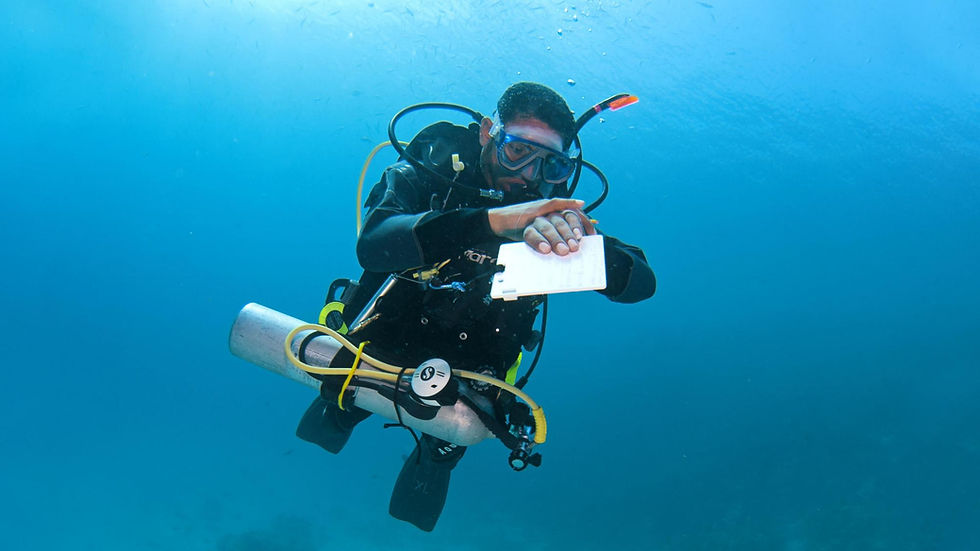So you’re an Advanced Diver… What Now? Here’s our run down on our top 5 PADI Speciality Courses
- Emma Hudson
- May 9, 2023
- 3 min read
We love teaching PADI Speciality Courses, they are so much fun and a completely different experience than when you did your PADI Open Water Course. Whether it’s exploring wrecks, going to 40 Meters or learning safely how to dive on your own, there’s a lot to experience – here’s our run down on our TOP 5 PADI Speciality Courses.
PADI Enriched Air Diver - Nitrox

Enriched air, also known as Nitrox or EANx, is one of the most popular PADI Speciality Courses Worldwide. Nitrox contains less nitrogen than regular air and breathing less nitrogen means you can enjoy longer bottom time on dives and shorter surface intervals.
After finishing your independent study, you'll learn how to analyse a tank, fill out an enriched air log, and set your dive computer for nitrox. This course can be done at your Dive Centre, either Dry (without dives) or with 2 dives.
PADI Deep Diver

During the PADI® Deep Diver course, you'll learn how to plan deep dives, manage your air supply and how to identify and manage narcosis.
When you dive below 18 metres/60 feet, there are special safety c
onsiderations. If you're ready to expand your boundaries, a PADI Instructor will help you gain the skills and confidence to explore to a maximum depth of 40 metres/130 feet.
During four dives with a PADI Instructor, you'll practice descents, buoyancy, and safety stops. Through hands-on exercises, you'll discover how deep dives affect colour, physical objects and your brain.
PADI Wreck Diver
Whether purposely sunk as an artificial reef for scuba divers, or lost as the result of an accident, wrecks are fascinating.

Ships, airplanes and even cars are fascinating to explore and usually teem with aquatic life.
The PADI Wreck Diver Specialty course is popular because it offers rewarding adventures while observing responsible wreck diving practices.
During four dives with your instructor, you’ll survey and map a wreck, practice special finning techniques and may use penetration lines.
PADI Digital Underwater Photography

You could spend hours learning underwater photography through trial and error, or you can take a shortcut.
Learn professional tricks and tips for taking great photos underwater and the best way to capture video while scuba diving with a GoPro (or other action camera).
During two dives you’ll get hands-on experience taking photos with a compact camera or action camera (use your own or ask about rental). You’ll use the SEA (Shoot, Examine, Adjust) method for getting great shots.
PADI Self Reliant Diver

My Personal Favourite!! With proper training, equipment, and the right attitude to accept the risks involved in independent diving, an experience diver can responsibly engage in dives without a buddy.
If you have the mental discipline and commitment to learn and follow self-reliant diving techniques, you'll bolster your skills and confidence when diving alone, in a dive pair or as part of a team.
You need to be a PADI Advanced Open Water Diver and have 100 logged dives to enrol in the Self-Reliant Diver course. Learning how to compensate for situations you would normally handle with a buddy is the focus of the Self-Reliant Diver course. This includes proper dive planning using air consumption rate calculations, life support system redundancy, and independent management of dive emergencies.
We conduct all these speciality courses here at PKT Diving on Phi Phi Island, plus many more - Why not reach out to us now to enquire about enhancing your Diving Skills on your next holiday!





Comments